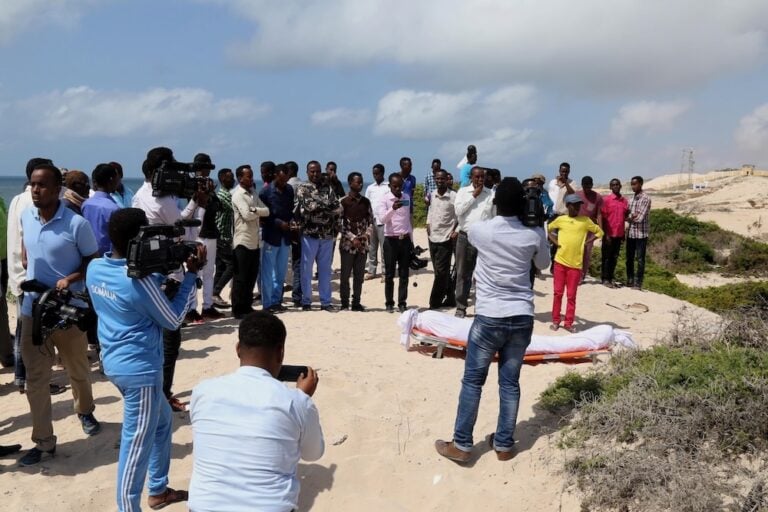(RSF/IFEX) – Reporters Without Borders issued an urgent appeal to the international community for energetic measures towards the Somali government on behalf of the country’s journalists after the murder in Mogadishu of Bashir Nur Gedi, the head of the Shabelle press group on 19 October 2007. Gedi is the eighth journalist to be slain this […]
(RSF/IFEX) – Reporters Without Borders issued an urgent appeal to the international community for energetic measures towards the Somali government on behalf of the country’s journalists after the murder in Mogadishu of Bashir Nur Gedi, the head of the Shabelle press group on 19 October 2007. Gedi is the eighth journalist to be slain this year in Somalia and the third leading media owner to be killed by unidentified gunmen in the capital (see IFEX alert of 19 October 2007).
“The security situation in Mogadishu seems to be completely out of control,” Reporters Without Borders said. “Abandoned by the Somali authorities and their international partners, journalists have become key targets who are easily accessible. One after another, the country’s leading media owners are being eliminated. By taking no action in this climate of total impunity, those who could be in a position to stop these murders will end up becoming accomplices.”
The press freedom organisation also strongly condemned the arbitrary arrests of journalists that continue to be carried out by local and federal authorities throughout the country.
The National Union of Somali Journalists (NUSOJ), the Reporters Without Borders partner organisation in Somalia, said Gedi was killed outside his home in south Mogadishu by a group of young gunmen aged from about 14 to 20. They shot him several times in the head and chest, killing him instantly, and then fled. One of Gedi’s senior employees, Radio Shabelle acting manager Jafar “Kukay” Mohammed, was himself the target of a murder attempt less than a month earlier (see alert of 27 September 2007).
The station marked Gedi’s murder by suspending programmes and broadcasting verses from the Koran.
Five journalists were arrested on 19 October, three of them in the northeastern region of Puntland, the stronghold of the transitional government’s current president, Abdullahi Yusuf Ahmed. They were Radio Garowe news editor Isse Abdullahi Mohammed, the station’s manager, Abdi Farah Jama Mire, and one of its producers, Mohammad Dahir Yusuf. The authorities, who closed down the station, later released Mire and Yusuf, but they are still holding Mohammed.
Local journalists said the arrests were prompted by Radio Garowe’s recent broadcast of an interview with Ahmed’s former security chief who has broken with the president. During the interview, he announced that he would soon publish revelations about abuses committed by the government.
The other two arrests were in Mogadishu. Abdullahi Mohammed “Black” Hassan, the editor of the daily newspaper “Ayaamaha”, was arrested at his office and was held overnight, for a total of 12 hours, without ever being told why. Abdirashid Abdulle Abikar, a NUSOJ member and Agence France-Presse stringer, was briefly detained while taking photos of injured people in the capital’s Medina hospital. Some of his equipment was confiscated by the security forces. The NUSOJ said the reasons for these arrests were unknown.


